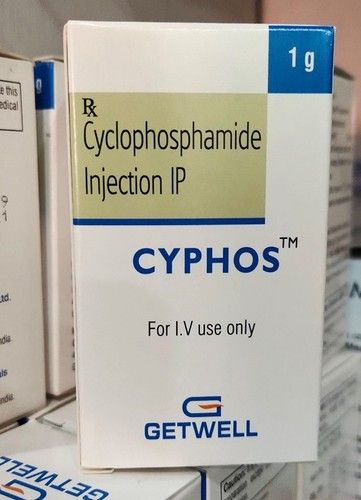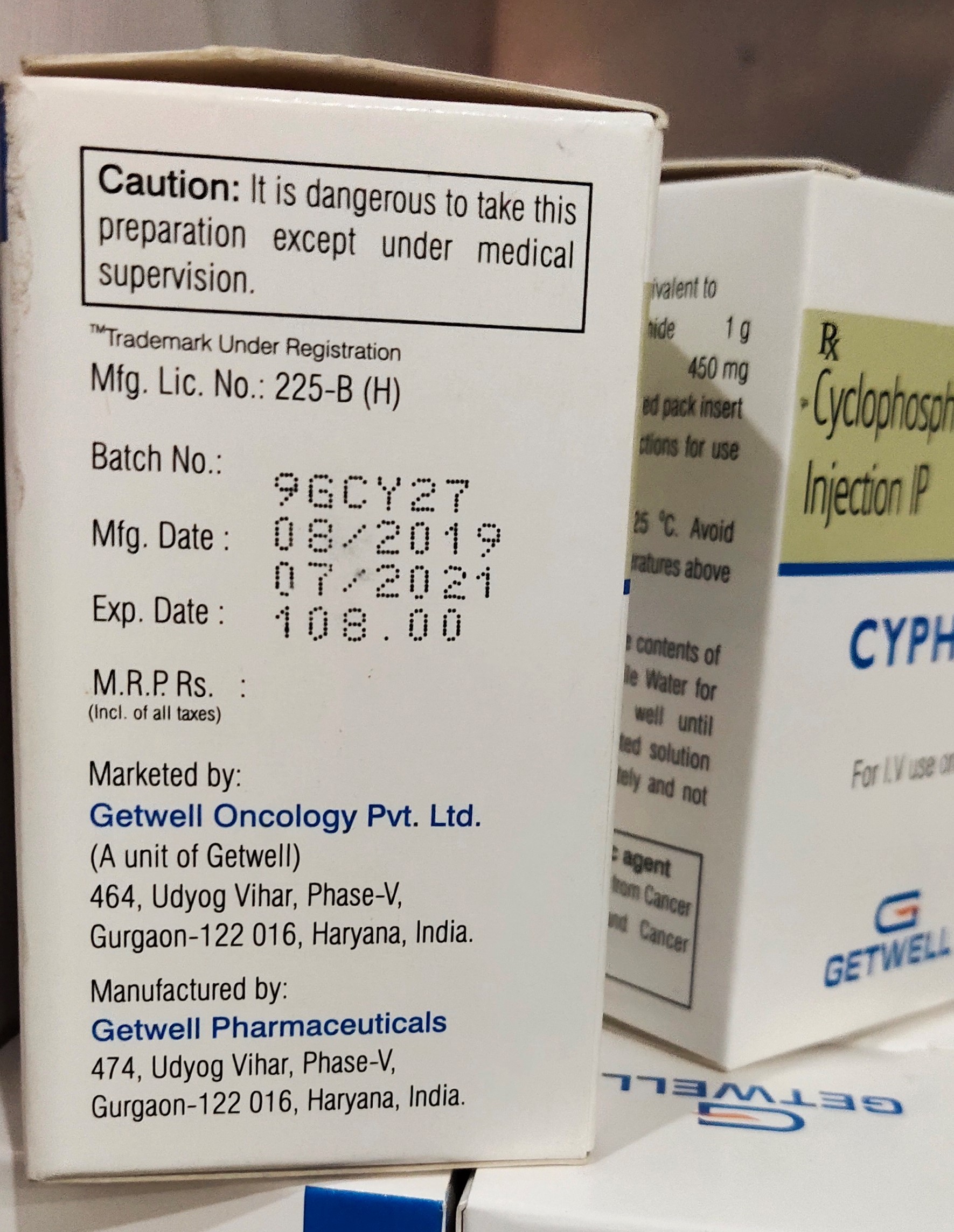 :08045812163
:08045812163

Cyclophosphamide Injection (cyphos) 1G
87 INR/Bottle
Product Details:
- Enzyme Types Enzyme Preparations
- Feature Food Grade, Dry Enzyme
- Ingredients Natural Yeast
- Ph Level 3.5-5.5
- Temperature Needed For Fermentation NORMAL Celsius (oC)
- Physical Color/Texture Other
- Fermentation Smell Normal Smell
- Click to view more
X
Cyclophosphamide Injection (cyphos) 1G Price And Quantity
- 85.00 - 90.00 INR/Bottle
- 87 INR/Bottle
- 100 Bottle
Cyclophosphamide Injection (cyphos) 1G Product Specifications
- NORMAL Celsius (oC)
- Food Grade, Dry Enzyme
- JULY 2021 Years
- Natural Yeast
- Other
- SHOULD BE TAKEN UNDER MEDICAL SUPERVISION
- Normal Smell
- 3.5-5.5
- Enzyme Preparations
Cyclophosphamide Injection (cyphos) 1G Trade Information
- DELHI
- 7 Bottle Per Day
- 7 Days
- Contact us for information regarding our sample policy
- Africa, Eastern Europe, Middle East, Western Europe, North America, South America, Asia, Central America, Australia
- All India
Product Description
Cyclophosphamide Injection, sometimes known as "Cyphos," is a drug used in medical settings as of my most recent update in September 2021 for a variety of ailments. It belongs to the group of medications known as alkylating agents and inhibits the development of cancer cells as well as the immune systems reaction. In general, Cyclophosphamide Injection (Cyphos) 1g is described as follows: Usage: Leukemia, lymphoma, multiple myeloma, and several solid tumors are among the cancers that are most commonly treated with cyclophosphamide. It is frequently used as part of a larger treatment program or in conjunction with other chemotherapy medications.Considering that cyclophosphamide is an alkylating chemical, it damages DNA by attaching alkyl groups to DNA molecules. The cancer cells are destroyed as a result of the damage, which prevents the cancer cells from proliferating and multiplying. The ability of cyclophosphamide to decrease immune system activity makes it helpful in treating some autoimmune diseases and reducing the rejection of organ transplants.Administration: In a medical environment like a hospital or clinic, cyclophosphamide is normally administered intravenously (IV) by healthcare professionals. Various factors, including the specific medical condition being treated, the patients general health, and others, affect the dosage and frequency of administration. It is crucial to adhere to the doctors instructions regarding the recommended course of treatment.Cyclophosphamide may have side effects, and the severity of these side effects varies from person to person as it does with all medications. Nausea, vomiting, hair loss, exhaustion, and an elevated risk of infections because of a decreased immunological response are typical adverse effects. Patients must inform their healthcare provider of any side effects because some of them may call for urgent intervention.Precautions: The healthcare practitioner will evaluate the patients overall health and medical history prior to beginning Cyclophosphamide medication to make sure it is safe and appropriate for use. To prevent potential interactions or problems, it is crucial to let the healthcare professional know about any current medical conditions, allergies, or medications being used.Features ofCyclophosphamide InjectionAgent of chemotherapy: Cyclophosphamide is a potent and useful chemotherapy medication that is frequently used in the management of cancer. Leukemia, lymphoma, breast cancer, ovarian cancer, and multiple myeloma are just a few of the cancers for which it is recommended.Cyclophosphamide is also used as an immunosuppressive medication to treat autoimmune diseases like lupus, vasculitis, and rheumatoid arthritis. It aids in reducing the bodys hyperactive immune system, which targets healthy tissue.Cyclophosphamide is available in injectable form for intravenous (IV) administration, enabling direct bloodstream administration. As a result, there is a quicker beginning of action and accurate dosage delivery.Benefits ofCyclophosphamide InjectionCyclophosphamide is an effective cancer medication that can either kill or halt the growth of cancer cells. The cancer cells DNA is harmed, which prevents the cancer cells from proliferating and spreading. This slows the growth of tumors and slows the spread of cancer.Management of autoimmune disorders: In autoimmune illnesses, the immune system assaults healthy tissues inadvertently, causing inflammation and damage. Inhibiting the hyperactive immune response with cyclophosphamide helps to reduce symptoms and stop future organ and tissue damage.Combination therapy: To improve the effectiveness of treatment, cyclophosphamide is frequently combined with other chemotherapeutic medicines or therapies. Combining various medications can take multiple approaches to combating cancer cells ability to acquire resistance.FAQ ofCyclophosphamide Injection1. What is an injection of cyclophosphamide?A chemotherapy drug called cyclophosphamide injection is used to treat several cancers, including lymphoma, leukemia, and ovarian cancer.2. How is the injection of cyclophosphamide administered?Typically, cyclophosphamide injection is administered intravenously. The precise ailment being treated, as well as other variables that the healthcare provider has decided upon, will dictate the dosage and frequency of administration.3. What are cyclophosphamide injections typical side effects?Cyclophosphamide Injection can cause a number of common adverse effects, such as nausea, vomiting, hair loss, low blood cell counts, increased infection risk, and bladder irritation. You will be constantly watched by your healthcare professional for any potential adverse effects.4. Does Cyclophosphamide Injection come with any cautions or warnings?The immune system may be suppressed by cyclophosphamide injection, raising the risk of infection. Additionally, it might harm the bladder and raise the possibility of getting some types of cancer. Before beginning therapy, its crucial to go through your medical background and any current drugs with your healthcare professional.5. Can women who are pregnant or nursing take cyclophosphamide injection?It is not advised to use cyclophosphamide injection while pregnant.FAQs of Cyclophosphamide Injection (cyphos) 1G:
Q: What are the key ingredients in Cyclophosphamide Injection (Cyphos) 1G?
A: Cyclophosphamide Injection (Cyphos) 1G contains Natural Yeast and Enzyme Preparations.Q: What is the physical color/texture of Cyclophosphamide Injection (Cyphos) 1G?
A: The product has a physical color/texture classified as "Other."Q: What is the recommended pH level for Cyclophosphamide Injection (Cyphos) 1G?
A: The recommended pH level ranges from 3.5 to 5.5.Q: How should Cyclophosphamide Injection (Cyphos) 1G be stored?
A: Cyclophosphamide Injection (Cyphos) 1G should be taken under medical supervision.Q: What is the shelf life of Cyclophosphamide Injection (Cyphos) 1G?
A: The shelf life of Cyclophosphamide Injection (Cyphos) 1G is July 2021 years.Q: What temperature is required for fermentation of Cyclophosphamide Injection (Cyphos) 1G?
A: Normal Celsius (C) temperature is needed for fermentation of Cyclophosphamide Injection (Cyphos) 1G.Q: Does Cyclophosphamide Injection (Cyphos) 1G exhibit any peculiar smell during fermentation?
A: No, Cyclophosphamide Injection (Cyphos) 1G has a normal smell during fermentation.Tell us about your requirement

Price:
Quantity
Select Unit
- 50
- 100
- 200
- 250
- 500
- 1000+
Additional detail
Mobile number
Email
Other Products in 'Anti Cancer Injection' category
"Our export market include Kenya, Oman, Dubai, Vietnam, Philippines, Hong Kong, Nigeria, Yemen, Ethiopia."
 |
BIOGEN INDIA
All Rights Reserved.(Terms of Use) Developed and Managed by Infocom Network Private Limited. |
 English
English Spanish
Spanish French
French German
German Italian
Italian Chinese (Simplified)
Chinese (Simplified) Japanese
Japanese Korean
Korean Arabic
Arabic Portuguese
Portuguese








